不规则动词表 形容词 副词比较级最高级不规则变化表
英语比较级和最高级的变化规则
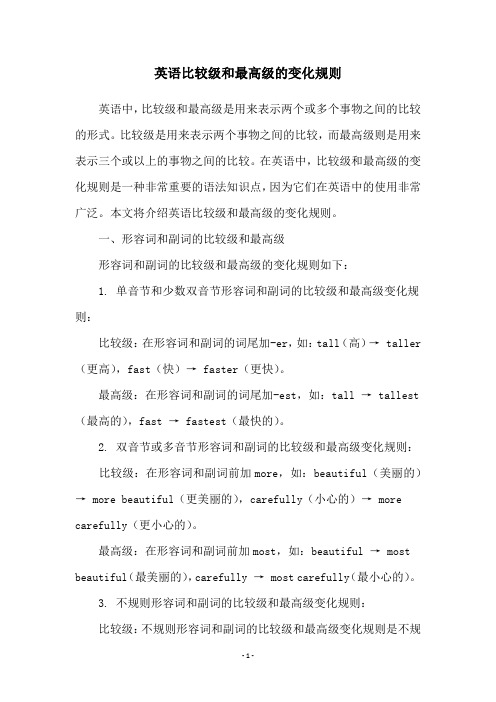
英语比较级和最高级的变化规则英语中,比较级和最高级是用来表示两个或多个事物之间的比较的形式。
比较级是用来表示两个事物之间的比较,而最高级则是用来表示三个或以上的事物之间的比较。
在英语中,比较级和最高级的变化规则是一种非常重要的语法知识点,因为它们在英语中的使用非常广泛。
本文将介绍英语比较级和最高级的变化规则。
一、形容词和副词的比较级和最高级形容词和副词的比较级和最高级的变化规则如下:1. 单音节和少数双音节形容词和副词的比较级和最高级变化规则:比较级:在形容词和副词的词尾加-er,如:tall(高)→ taller (更高),fast(快)→ faster(更快)。
最高级:在形容词和副词的词尾加-est,如:tall → tallest (最高的),fast → fastest(最快的)。
2. 双音节或多音节形容词和副词的比较级和最高级变化规则:比较级:在形容词和副词前加more,如:beautiful(美丽的)→ more beautiful(更美丽的),carefully(小心的)→ more carefully(更小心的)。
最高级:在形容词和副词前加most,如:beautiful → most beautiful(最美丽的),carefully → most carefully(最小心的)。
3. 不规则形容词和副词的比较级和最高级变化规则:比较级:不规则形容词和副词的比较级和最高级变化规则是不规则的,需要记忆。
如:good(好的)→ better(更好的),well(好地)→ better(更好的),bad(坏的)→ worse(更坏的)。
最高级:不规则形容词和副词的最高级变化规则也是不规则的,需要记忆。
如:good → best(最好的),well → best(最好的),bad → worst(最坏的)。
二、名词的比较级和最高级名词的比较级和最高级的变化规则如下:1. 单数名词的比较级和最高级变化规则:比较级:在名词前加more,如:car(车)→ more cars(更多的车)。
形容词副词比较级和最高级
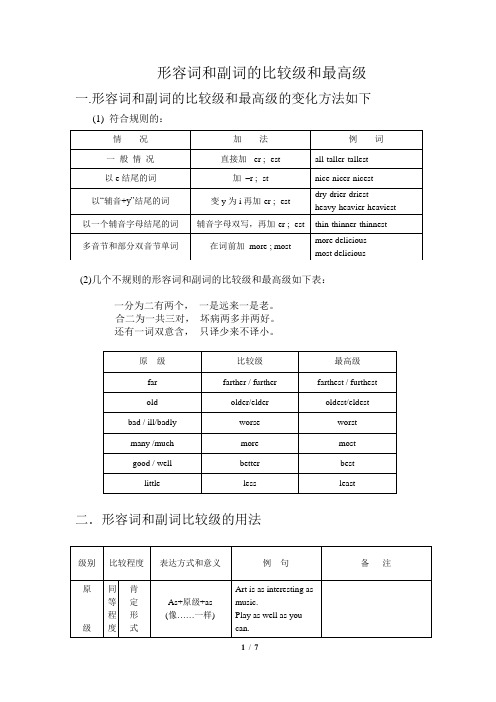
形容词和副词的比较级和最高级一.形容词和副词的比较级和最高级的变化方法如下(1) 符合规则的:(2)几个不规则的形容词和副词的比较级和最高级如下表:一分为二有两个,一是远来一是老。
合二为一共三对,坏病两多并两好。
还有一词双意含,只译少来不译小。
二.形容词和副词比较级的用法注意:有些形容词,如 dead, empty, round, sure, woolen 等受本身含义的限制,没有比较级。
例题解析1. He is ________ friends than I.A. much moreB. many moreC. very moreD. too more2. Which is the _________ country, Japan or Australia?A. more developedB. more developingC. most developedD. most developing3. There were _______ shops in the city in 1982 than in 1990.A. littleB. fewC. fewerD. less4. He can't tell us ________, I think.A. important anythingB. anything importantC. important somethingD. something important.5. The Huang River is the second __________ river in our country.A. longB. longerC. longestD. the longest6. The light in the office wasn't ________for him to read.A. enough brightB. bright enoughC. brightlyD. enough brightly三.形容词副词比较级最高级的其他用法(1)和冠词连用the +形容词原级+v(复),指一类人或物the +形容词比较级,指两者中“较…的”的那一个,eg. the younger of the twoa/ an +形容词比较级eg. The pen is expensive. I want a cheaper one.( a) +most+形容词最高级“非常…”eg. a most beautiful city( 2 ) 相关结构1)原级比较:肯定句as….as…., 否定句not so / as….as…..2)比较句:比较级+than….或more (less) ….than…..The furniture in this shop is less beautiful than that in that shop.(注意代词that的用法)3)比较级+and+比较级或more and more+比较级“越来越… ”richer and richer, more and more interesting4)The more….., the more…..“越…,越…”The more you look at the picture, the better you will like it.5) 比较级+than any other +n. (单)(适用于范围一致时)(all) other +n.(复)any +n.(单) (适用于范围不一致时)He is taller than any other student / all other students in his class.any student in my class.6) 倍数表达法。
不规则动词及比较级,最高级的不规则变化
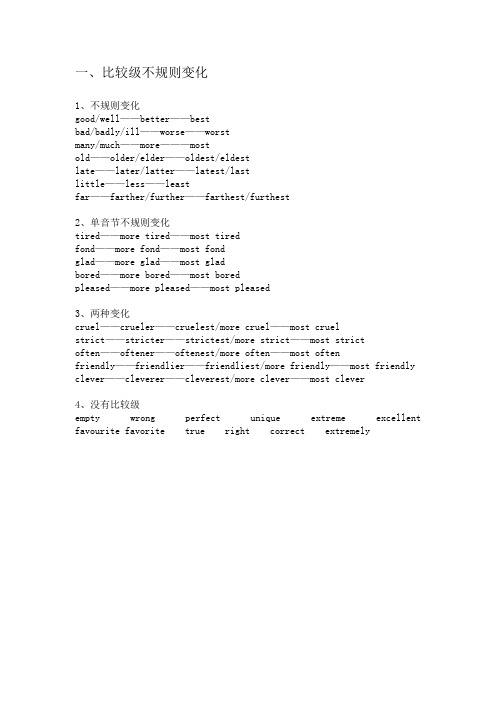
一、比较级不规则变化1、不规则变化good/well——better——bestbad/badly/ill——worse——worstmany/much——more———mostold——older/elder——oldest/eldestlate——later/latter——latest/lastlittle——less——leastfar——farther/further——farthest/furthest2、单音节不规则变化tired——more tired——most tiredfond——more fond——most fondglad——more glad——most gladbored——more bored——most boredpleased——more pleased——most pleased3、两种变化cruel——crueler——cruelest/more cruel——most cruel strict——stricter——strictest/more strict——most strict often——oftener——oftenest/more often——most often friendly——friendlier——friendliest/more friendly——most friendly clever——cleverer——cleverest/more clever——most clever4、没有比较级empty wrong perfect unique extreme excellent favourite favorite true right correct extremely二、过去式不规则变化1、A A A型(动词原形、过去式、过去分词同形)cost(花费)——cost——costcut(割)——cut——cuthit(打)——hit——hithurt (伤害)——hurt——hurtlet(让)——let——letput(放)——put——putread (读)——read——readset(安置)——set——setshut(关闭)——shut——shutbroadcast(广播)——broadcast——broadcastburst(爆发)——burst——burstsplit(切开)——split——split2、AAB型(动词原形与过去式同形)beat(跳动)——beat——beaten3、ABA型(动词原形与过去分词同形)become(变成)——became——becomecome(来)——came——comerun(跑)——ran——run overcome——overcame——overcome4、 ABB型(过去式与过去分词同形)bend(使弯曲)——bentdig(挖)——dug——dugget(得到)——got——gothang(吊死)—— hanged——hangedhang(悬挂)——hung——hunghold(抓住)——held——heldshine(照耀)——shone——shonesit(坐)——sat——satwin(赢)——won——wonmeet(遇见)——met——met keep(保持)——kept——keptsleep(睡)——slept——slept sweep(扫)——swept——sweptfeel(感觉)——felt——felt smell(闻)——smelt——smeltleave(离开)——left——leftbuild(建设)——built——builtlend(借出)——lent——lent send (传送)——sent——sentspend(花费)——spent——spentlose(丢失)——lost——lostburn (燃烧)——burnt——burnt learn(学习)——learnt ——learntmean(意思是)——meant——meantcatch(抓住)——caught——caughtteach(教)——taught——taughtbring(带来)——broughtbroughtfight (战斗)——fought——foughtbuy(买)——bought——boughtthink(想)——thought——thoughthear (听见)——heard——heardsell(卖)——sold——soldtell(告诉)——told——toldsay(说)——said——saidfind(找到)——found——foundhave/has(有)——had——hadmake(制造)——made——madestand(站)——stood——stood understand(明白)——understood——understood5、ABC型(动词原形、过去式与过去分词三者不同形)begin(开始)——began——begundrink(喝)——drank——drunkring(铃响)——rang——rungsing (唱) sang sungswim(游泳) swam swum blow(吹) blew blowndraw(画) drew drawnfly(飞) flew flowngrow(生长) grew grownknow(知道) knew knownthrow(投掷) threw thrown show(出示) showed shownbreak(打破) broke broken choose(选择) chose chosenforget(忘记) forgot forgotten speak(说,讲) spoke spokenwake(醒) woke woken drive(驾驶) drove driveneat(吃) ate eatenfall(落下) fell fallengive(给) gave givenrise(升高) rose risentake(取) took takenmistake(弄错) mistook mistakenride(骑) rode riddenwrite(写) wrote writtendo(做) did donego(去) went gonelie(平躺) lay lain lie(说谎) lied liedsee(看见) saw seenwear(穿) wore wornam/is(是) was been are(是) were been。
形容词副词比较级最高级变化形式及用法
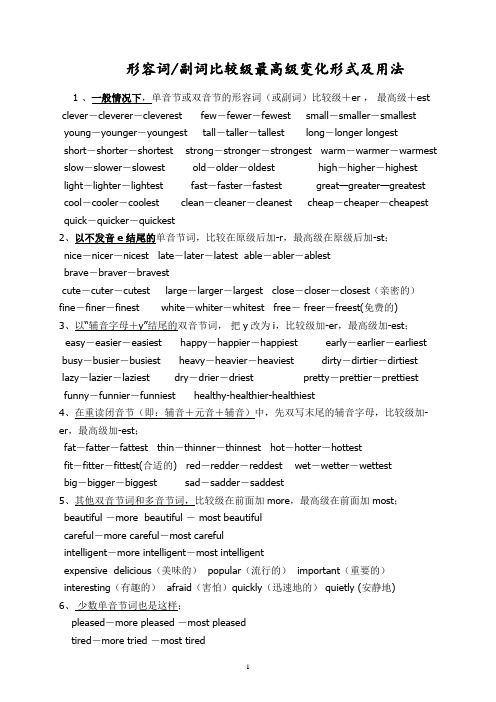
形容词/副词比较级最高级变化形式及用法1 、一般情况下,单音节或双音节的形容词(或副词)比较级+er ,最高级+est clever-cleverer-cleverest few-fewer-fewest small-smaller-smallest young-younger-youngest tall-taller-tallest long-longer longestshort-shorter-shortest strong-stronger-strongest warm-warmer-warmest slow-slower-slowest old-older-oldest high-higher-highest light-lighter-lightest fast-faster-fastest great—greater—greatest cool-cooler-coolest clean-cleaner-cleanest cheap-cheaper-cheapest quick-quicker-quickest2、以不发音e结尾的单音节词,比较在原级后加-r,最高级在原级后加-st;nice-nicer-nicest late-later-latest able-abler-ablestbrave-braver-bravestcute-cuter-cutest large-larger-largest close-closer-closest(亲密的)fine-finer-finest white-whiter-whitest free- freer-freest(免费的)3、以“辅音字母+y”结尾的双音节词,把y改为i,比较级加-er,最高级加-est;easy-easier-easiest happy-happier-happiest early-earlier-earliest busy-busier-busiest heavy-heavier-heaviest dirty-dirtier-dirtiestlazy-lazier-laziest dry-drier-driest pretty-prettier-prettiest funny-funnier-funniest healthy-healthier-healthiest4、在重读闭音节(即:辅音+元音+辅音)中,先双写末尾的辅音字母,比较级加-er,最高级加-est;fat-fatter-fattest thin-thinner-thinnest hot-hotter-hottestfit-fitter-fittest(合适的) red-redder-reddest wet-wetter-wettestbig-bigger-biggest sad-sadder-saddest5、其他双音节词和多音节词,比较级在前面加more,最高级在前面加most;beautiful -more beautiful - most beautifulcareful-more careful-most carefulintelligent-more intelligent-most intelligentexpensive delicious(美味的) popular(流行的) important(重要的)interesting(有趣的) afraid(害怕)quickly(迅速地的) quietly (安静地)6、少数单音节词也是这样;pleased-more pleased -most pleasedtired-more tried -most tired7、少数不规则形容词、副词的比较级和最高级,必须熟记。
不规则动词及比较级-最高级的不规则变化
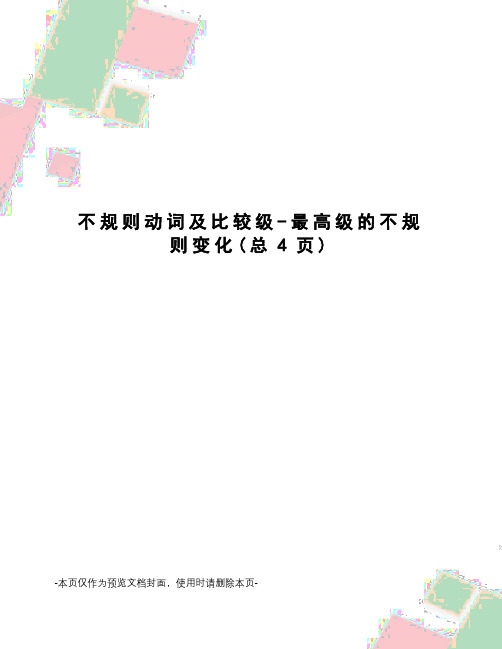
不规则动词及比较级-最高级的不规则变化(总4页)-本页仅作为预览文档封面,使用时请删除本页-一、比较级不规则变化1、不规则变化good/well——better——bestbad/badly/ill——worse——worstmany/much——more———mostold——older/elder——oldest/eldestlate——later/latter——latest/lastlittle——less——leastfar——farther/further——farthest/furthest2、单音节不规则变化tired——more tired——most tiredfond——more fond——most fondglad——more glad——most gladbored——more bored——most boredpleased——more pleased——most pleased3、两种变化cruel——crueler——cruelest/more cruel——most cruel strict——stricter——strictest/more strict——most strict often——oftener——oftenest/more often——most often friendly——friendlier——friendliest/more friendly——most friendly clever——cleverer——cleverest/more clever——most clever4、没有比较级empty wrong perfect unique extreme excellent favourite favorite true right correct extremely二、过去式不规则变化1、A A A型(动词原形、过去式、过去分词同形)cost(花费)——cost——costcut(割)——cut——cuthit(打)——hit——hithurt (伤害)——hurt——hurtlet(让)——let——letput(放)——put——putread (读)——read——readset(安置)——set——setshut(关闭)——shut——shutbroadcast(广播)——broadcast——broadcast burst(爆发)——burst——burstsplit(切开)——split——split2、AAB型(动词原形与过去式同形)beat(跳动)——beat——beaten3、ABA型(动词原形与过去分词同形)become(变成)——became——becomecome(来)——came——comerun(跑)——ran——run overcome——overcame——overcome4、 ABB型(过去式与过去分词同形)bend(使弯曲)——bentdig(挖)——dug——dugget(得到)——got——gothang(吊死)—— hanged——hangedhang(悬挂)——hung——hunghold(抓住)——held——heldshine(照耀)——shone——shonesit(坐)——sat——satwin(赢)——won——wonmeet(遇见)——met——metkeep(保持)——kept——keptsleep(睡)——slept——sleptsweep(扫)——swept——sweptfeel(感觉)——felt——feltsmell(闻)——smelt——smeltleave(离开)——left——leftbuild(建设)——built——builtlend(借出)——lent——lentsend (传送)——sent——sentspend(花费)——spent——spentlose(丢失)——lost——lostburn (燃烧)——burnt——burntlearn(学习)——learnt ——learntmean(意思是)——meant——meantcatch(抓住)——caught——caughtteach(教)——taught——taughtbring(带来)——broughtbroughtfight (战斗)——fought——foughtbuy(买)——bought——boughtthink(想)——thought——thoughthear (听见)——heard——heardsell(卖)——sold——soldtell(告诉)——told——toldsay(说)——said——saidfind(找到)——found——foundhave/has(有)——had——hadmake(制造)——made——madestand(站)——stood——stood understand(明白)——understood——understood5、ABC型(动词原形、过去式与过去分词三者不同形)begin(开始)——began——begundrink(喝)——drank——drunkring(铃响)——rang——rungsing (唱) sang sungswim(游泳) swam swumblow(吹) blew blowndraw(画) drew drawnfly(飞) flew flowngrow(生长) grew grownknow(知道) knew knownthrow(投掷) threw thrownshow(出示) showed shownbreak(打破) broke brokenchoose(选择) chose chosenforget(忘记) forgot forgottenspeak(说,讲) spoke spokenwake(醒) woke wokendrive(驾驶) drove driveneat(吃) ate eatenfall(落下) fell fallengive(给) gave given rise(升高) rose risentake(取) took taken mistake(弄错) mistook mistaken ride(骑) rode ridden write(写) wrote writtendo(做) did done go(去) went gonelie(平躺) lay lain lie(说谎) lied liedsee(看见) saw seen wear(穿) wore wornam/is(是) was been are(是) were been。
初中英语语法形容词和副词的比较级和最高级

形容词和副词的比较级和最高级一.形容词和副词的比较级和最高级的变化方法如下(1) 符合规则的:(2)几个不规则的形容词和副词的比较级和最高级如下表:二.形容词和副词比较级的用法注意:有些形容词,如 dead, empty, round, sure, woolen 等受本身含义的限制,没有比较级。
例题解析1. He is ________ friends than I.A. much moreB. many moreC. very moreD. too more2. Which is the _________ country, Japan or Australia?A. more developedB. more developingC. most developedD. most developing3. There were _______ shops in the city in 1982 than in 1990.A. littleB. fewC. fewerD. less4. If you are not free today, come another day __________.A. tooB. soC. insteadD. yet5.He can't tell us ________, I think.A. important anythingB. anything importantC. important somethingD. something important.6. The Huang River is the second __________ river in our country.A. longB. longerC. longestD. the longest7. The light in the office wasn't ________for him to read.A. enough brightB. bright enoughC. brightlyD. enough brightly.8. There was an accident at the corner. ________, the girl wasn't _________hurt.A. luckily, badlyB. luck, hardlyC. Lucky, heavilyD. Lucky, strongly9. Five days has passed , but I haven't finished half of the work________,A. alreadyB. stillC. tooD. yet三.形容词副词比较级最高级的其他用法(1)和冠词连用the +形容词原级+v(复),指一类人或物the +形容词比较级,指两者中“较…的”的那一个,eg. the younger of the twoa/ an +形容词比较级eg. The pen is expensive. I want a cheaper one.( a) +most+形容词最高级“非常…”eg. a most beautiful city( 2 ) 相关结构1)原级比较:肯定句as….as…., 否定句not so / as….as…..2)比较句:比较级+than….或more (less) ….than…..The furniture in this shop is less beautiful than that in that shop.(注意代词that的用法)3)比较级+and+比较级或more and more+比较级“越来越… ”richer and richer, more and more interesting4)The more….., the more…..“越…,越…”The more you look at the picture, the better you will like it.5) 比较级+than any other +n. (单)(适用于范围一致时)(all) other +n.(复)any +n.(单) (适用于范围不一致时)He is taller than any other student / all other students in his class.any student in my class.6) 倍数表达法。
不规则动词及比较级最高级的不规则变化

不规则动词及比较级最高级的不规则变化1. Good (好)
比较级:better (更好)
最高级:best (最好)
2. Bad (坏)
比较级:worse (更坏)
最高级:worst (最坏)
3. Far (远)
比较级:farther/further (更远)
最高级:farthest/furthest (最远)
4. Little (少)
比较级:less (更少)
最高级:least (最少)
5. Many/Much (许多/许多)
比较级:more (更多)
最高级:most (最多)
6. Late (迟)
比较级:later (更迟)
最高级:latest (最迟)
7. Old (老)
比较级:older/elder (年长的)
最高级:oldest/elder (最年长的)
8. Little (小)
比较级:lesser (更小)
最高级:least (最小)
9. Big (大)
比较级:bigger (更大)
最高级:biggest (最大)
10. High (高)
比较级:higher (更高)
最高级:highest (最高)
请注意,这只是一些常用的不规则动词的比较级和最高级形式。
其他不规则动词的变形可能会有所不同。
中考英语不规则动词名词形容词副词形式变换
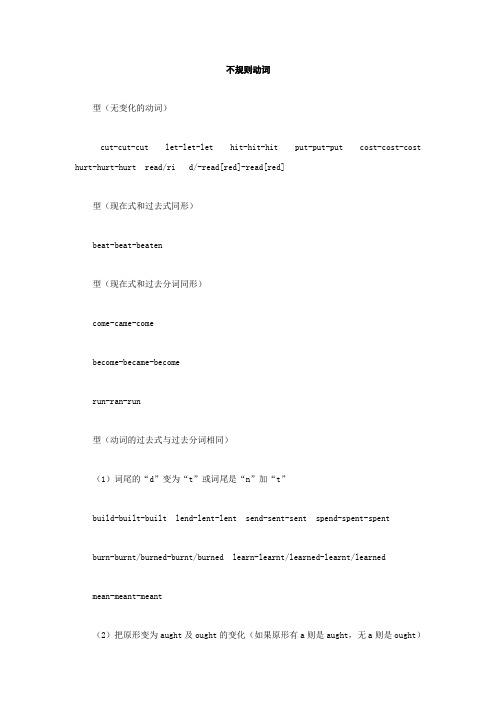
不规则动词型(无变化的动词)cut-cut-cut let-let-let hit-hit-hit put-put-put cost-cost-cost hurt-hurt-hurt read/ri d/-read[red]-read[red]型(现在式和过去式同形)beat-beat-beaten型(现在式和过去分词同形)come-came-comebecome-became-becomerun-ran-run型(动词的过去式与过去分词相同)(1)词尾的“d”变为“t”或词尾是“n”加“t”build-built-built lend-lent-lent send-sent-sent spend-spent-spentburn-burnt/burned-burnt/burned learn-learnt/learned-learnt/learnedmean-meant-meant(2)把原形变为aught及ought的变化(如果原形有a则是aught,无a则是ought)buy-bought-bought bring-brought-brought think-thought-thoughtfight-fought-fought catch-caught-caught teach-taught-taught(3)eep变ept或过去式、过去分词含有/e/音的动词keep-kept-kept sleep-slept-slept sweep-swept-swept leave-left-leftsay-said-said meet-met-met spell-spelt-speltsmell-smelt/smelled-smelt/smelled hold-held-held feel-felt-felt(4)其他dig-dug-dug find-found-found stand-stood-stoodunderstand-understood-understood get-got-got sit-sat-satspoil-spoilt-spoilt have/has-had-had sell-sold-sold tell-told-told hang-hanged/hung-hanged/hung hear-heard-heard make-made-madepay-paid-paid lay-laid-laid lie(说谎)-lied-lied lose-lost-lostshine-shone/shined-shone/shined win-won-won shoot-shot-shot型(现在式、过去式和过去分词都不相同)(1)in、im的变化(i-a-u型)sing-sang-sung ring-rang-rung begin-began-begundrink-drank-drunk swim-swam-swum sink-sank-sunk(2)在动词原形后加-n或-en构成过去分词①ow及aw的变化(过去式以ew结尾,过去分词以wn结尾)draw-drew-drawn know-knew-known throw-threw-thrownblow-blew-blown grow-grew-grown fly-flew-flown②元音是i的开音节的变化(过去分词以en结尾)drive-drove-driven rise-rose-risen ride-rode-riddenwrite-wrote-written give-gave-given③其他see-saw-seen eat-ate-eaten take-took-taken fall-fell-fallen freeze-froze-frozen show-showed-shown break-broke-brokenspeak-spoke-spoken wake-woke-woken choose-chose-chosenforget-forgot-forgotten lie(躺,放)-lay-lain wear-wore-wornbe(am,is,are)-was/were-been(3)其他go-went-gone do-did-done6.有过去式,没有过去分词的动词can-could may-might must-must shall-should will-would不规则名词复数形式1.以-f或-fe结尾的名词变复数(1)加-s,如:belief-beliefs roof-roofs gulf-gulfs(2)去f,fe加-ves,如:half-halves knife-knives leaf-leaves life-lives wolf-wolvesthief-thieves self-selves wife-wives shelf-shelves歌诀记忆:树叶(leaf)半数(half)自己(self)黄;妻子(wife)拿刀(knife)去割粮;架(shelf)后窜出一匹狼(wolf);就像小偷(thief)逃命(life)亡。
